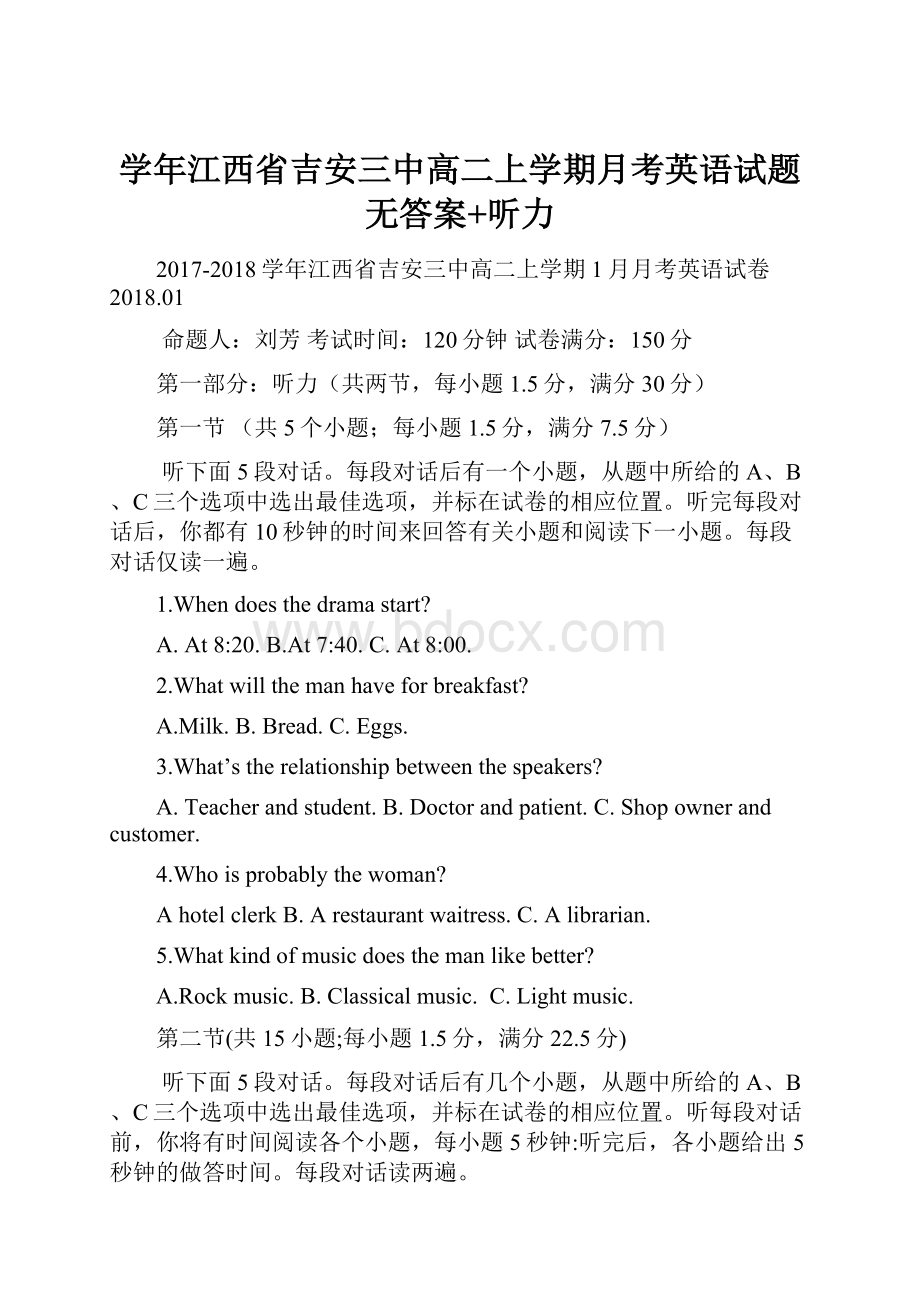学年江西省吉安三中高二上学期月考英语试题无答案+听力.docx
《学年江西省吉安三中高二上学期月考英语试题无答案+听力.docx》由会员分享,可在线阅读,更多相关《学年江西省吉安三中高二上学期月考英语试题无答案+听力.docx(16页珍藏版)》请在冰豆网上搜索。

学年江西省吉安三中高二上学期月考英语试题无答案+听力
2017-2018学年江西省吉安三中高二上学期1月月考英语试卷2018.01
命题人:
刘芳考试时间:
120分钟试卷满分:
150分
第一部分:
听力(共两节,每小题1.5分,满分30分)
第一节(共5个小题;每小题1.5分,满分7.5分)
听下面5段对话。
每段对话后有一个小题,从题中所给的A、B、C三个选项中选出最佳选项,并标在试卷的相应位置。
听完每段对话后,你都有10秒钟的时间来回答有关小题和阅读下一小题。
每段对话仅读一遍。
1.Whendoesthedramastart?
A.At8:
20.B.At7:
40.C.At8:
00.
2.Whatwillthemanhaveforbreakfast?
A.Milk.B.Bread.C.Eggs.
3.What’stherelationshipbetweenthespeakers?
A.Teacherandstudent.B.Doctorandpatient.C.Shopownerandcustomer.
4.Whoisprobablythewoman?
AhotelclerkB.Arestaurantwaitress.C.Alibrarian.
5.Whatkindofmusicdoesthemanlikebetter?
A.Rockmusic.B.Classicalmusic.C.Lightmusic.
第二节(共15小题;每小题1.5分,满分22.5分)
听下面5段对话。
每段对话后有几个小题,从题中所给的A、B、C三个选项中选出最佳选项,并标在试卷的相应位置。
听每段对话前,你将有时间阅读各个小题,每小题5秒钟:
听完后,各小题给出5秒钟的做答时间。
每段对话读两遍。
听下面一段对话,回答第6和第7两个小题。
6.WhydidthemangotoEurope?
A.Toattendmeetings.B.Totravel.C.Tomeetsomeone.
7.What’stheprofessor’sname?
A.Johnson.B.Jackson.C.George.
听下面一段对话,回答第8和第9两个小题。
8.What’sthetroublewiththewoman?
A.Shecan’tgetoutoftheelevator.B.Shecan’tgetintotheelevator.
C.Shecan’tputoutthefireintheelevator.
9.Whatdoesthemando?
A.Apoliceman.B.Adoctor.C.Areceptionist.
听下面一段对话,回答第10至12三个小题。
10.Whatdothespeakerswanttodobeforegoingtothepark?
A.PracticeEnglishindoor.B.Buysomefoodinthesupermarket.
C.Gohometogetsomefood.
11.Whatproblemdothespeakersmeet?
A.Theyfeelhungry.B.Theyhavenomoneywiththem.
C.Theycan’tfindtheirEnglishbooks.
12.Whatarethespeakersprobablygoingtodointhepark?
A.Justsitthereandtalk.B.EatfoodandpracticeEnglish.
C.Lookforsomeonetoaskformoney.
听下面一段对话,回答第13至第16四个小题。
13.Whatdoweknowabouttheoldlady?
A.Sheisveryrich.B.Shehelpspoorstudentsgotocollege.
C.Sheraisesmoneyforaschool.
14.Whatkindofpersonistheman’sfather?
A.Impassive.B.Overconfident.C.Helpful.
15.Howcansomeonekeepagoodreputationaccordingtothewoman?
A.Bylettingmostpeopleacceptyou.B.Bydoingyourbesttomakeeveryonehappy.
C.Bygivingafavorableimpressiontoallpeople.
16.Wherearethespeakers?
A.Athome.B.Attheoffice.C.Atschool.
听下面一段独白,回答第17至第20四个小题。
17.WhydoPolishpeoplestartworkveryearlyinthemorninginsummer?
A.Toearnmoremoney.B.Torelaxearly.C.Toavoidthehotsun.
18.WhatisspecialaboutthewayPolishpeoplespendtheirfreetime?
A.Theyusuallyhaveaspecificpurposeinmind.
B.Theyoftengoforawalkataleisurelypace.
C.Theyprefertheseasidetothecountryside.
19.Whyarethereoftencrowdsofpeopleatthedoorofthetheatre?
A.Towatchafreeperformance.B.Towaittogointothetheatre.
C.Towaitforavailabletickets.
20.HowmanydaysofvacationdomanyPolishpeoplehaveeachyear?
A.About10.B.About20.C.About30.
第二部分:
阅读理解(共两节,满分40分)
第一节(共15小题,每小题2分,满分30分)
阅读下列短文,从每题所给的四个选项(A、B、C和D)中,选出最佳选项。
A
EatinginLondonBusMuseum
UpperDeckcafébar
ItislocatedinthefrontofthemuseumabovethegiftshopwhereyoucanrelaxandenjoyviewsoverthePiazzainCoventGarden.TheUpperDeckcaféoffersagreatselectionofhot&coldfoodanddrinkswhichareavailablethroughouttheday;itisafunandrelaxedsettingtomeetfriendsforgreatcoffee.
Openingtime
Sunday,MondayandTuesday10:
00-18:
30(lasthotfoodorders17:
30)
Wednesday,ThursdayandSaturday10:
00-19:
00(lasthotfoodorders18:
00)
Friday11:
00-19:
00(lasthotfoodorders18:
00)
*DuringschoolholidayperiodstheUpperDeckisopenfrom10:
00onFriday.
Familyfriendlyfacilities
Highchairs
Babychangingunit
LowerDeckcafébar
Locatedinthemainmuseum,theLowerDeckcaféoffersarangeofsandwiches,snacks,hotandcolddrinks.Italsoconsistsofapicnicareawheretheparentscanrelaxwithacupofcoffeewhilekeepinganeyeonthelittleone!
Openingtime
SaturdayandSunday10:
00-17:
30
*DuringschoolholidayperiodstheLowerDeckisopendailyfrom10:
00-17:
30.
Picnicarea
InadditiontotheUpperDeckandLowerDeckcafébars,themuseumalsohasasmallpicnicareainsidethemuseumwherevisitorscaneattheirownpackedlunches.
ContactusTel:
+44(0)2075981355
Email:
searcy@ltmuseum.co.uk
21.WherecanacouplefindahighchairfortheirbabyinLondonBusMuseum?
A.IntheUpperDeckcafébar.B.IntheLowerDeckcafébar.
C.Inthepicnicarea.D.Inthegiftshop.
22.WhencanyougetsomehotfoodintheUpperDeckcafébar?
A.At18:
00onSunday.B.At9:
30onThursday.
C.At10:
30onFriday.D.At17:
00onMonday.
23.Fromthepassagewecanlearnthat___________.
A.VisitorscaneattheirownpackedlunchesintheUpperDeckcafébar.
B.BoththeUpperandLowerDeckcafébaroffervariousfoodanddrinks.
C.TheUpperDeckcafébarisopendailyduringschoolholidayperiods.
D.Visitorscancontactthemuseumbymakingphonecallsorwritingletters.
B
I’vealwaysfeltaneedtobepreparedforwhateversituationI’vefoundmyselfin.
MymotheroncetookmetoastorewhenIwassevenyearsold.SheandIgottothecheckoutcounter,andsherealizedshehadforgottenacoupleofthingsonhershoppinglist.Sheleftmewiththecartandranofftogetwhatsheneeded.
“I’llberightback.”shesaid.Shewasgonejustafewminutes,butatthattime,Ihadloadedallthethingsonthebeltandeverythingwasrungup.Iwasleftstaringatthecashier,whowasstaringatme.“Doyouhavemoneyforme,son?
”shesaid.“I’llneedtobepaid.”
Ididn’trealizeshewasjusttryingtoamuseherself.SoIstoodthere,ashamedandembarrassed.Bythetimemymomreturned,Iwasangry.“Youleftmeherewithnomoney!
Thisladyaskedmeforthemoney,andIhadnothingtogiveher.”
NowthatI’manadult,you’llnevercatchmewithlessthan$200inmywallet.IwanttobepreparedincaseIneedit.
I’vealwaysadmiredpeoplewhoareover-prepared.Incollege,IhadaclassmatenamedNorman.Onedayhewasgivingaspeechonanoverheadprojector(投影仪)andinthemiddleofhistalk,thelightbulb(灯泡)ontheprojectorblewout.Wewouldhavetowaittenminutesuntilsomeonefoundanewprojector.
“It’sOkay.”heannounced.“There’snothingtoworryabout.”
Wewatchedhimwalkovertohisbagandpullsomethingout.Hehadbroughtalongasparebulbfortheoverheadprojector.Whocouldeventhinkofthat?
Ioftentoldmystudents,“Whenyougointothewildness,theonlythingyoucandependoniswhatyoutakewithyou.”Andessentially,thewildnessisanywherebutyourhomeoroffice.Sotakemoney.Packalightbulb.Beprepared.
24.Whywastheboyangrywithhismother?
A.Hismotherforgottobuysomething.B.Hehadjustquarreledwiththecashier.
C.Hismotherlefthimalone.D.Helostfaceinfrontofthecashier.
25.Whydidthecashierasktheboytopayforthepurchases?
A.Theboy’smotherwasawayforsomethingelse.B.Theboywasshoppingbyhimself.
C.Theboy’smotheraskedhertodoso.D.Thecashierwasplayingajokeonhim.
26.WhydidNormanbringasparebulbwithhim?
A.Heknewtheclassroomequipmentwasofpoorquality.
B.Hewasalwayswell-prepared.
C.Heknewthebulbontheprojectorwouldblowout.D.Hisspeechwasaboutbulbs.
27.Whatdoesthewriterwanttotellus?
A.Nothingisimpossible.B.Moneyisthekeythatopensalldoors.
C.Infairweather,prepareforarainyday.D.Accidentshappenalmosteveryday.
C
Anewstudyhasdiscoveredthatmeditation(冥想)andoxygensporttogetherreducedepression.TheRutgersUniversitystudyfoundthatthismindandbodycombination,donetwiceaweekforonlytwomonths,reducedthesymptomsforagroupofstudentsby40percent.
“Weareexcitedbythefindingsbecausewesawsuchameaningfulimprovementinbothclinicallydepressedandnon—depressedstudents,”saidleadauthorDr.BrandonAlderman.“Itisthefirsttimethatbothofthesetwobehavioralwayshavebeenlookedattogetherfordealingwithdepression.”
Researchersbelievethetwoactivitieshaveaninteractiveeffectincombatingdepression.AldermanandDr.TraceyShorsdiscoveredthatacombinationofmentalandphysicaltraining(MAP)enabledstudentswithmajordepressivedisordernottoletproblemsornegativethoughtsdefeatthem.
Rutgersresearcherssaythosewhoparticipatedinthestudybeganwith30minutesoffocusedattentionmeditationfollowedby30minutesofoxygensport.Theyweretoldthatiftheirthoughtsdriftedtothepastorthefuturetheyshouldrefocusontheirbreathing,enablingthosewithdepressiontoacceptmoment-to-momentchangesinattention.
Shors,whostudiestheproductionofnewbraincellsinthehippocampus—partofthebraininvolvedinmemoryandlearning—saysscientistshaveshowninanimalmodelsthatoxygensportexercisekeepsalargenumberofcertaincellsalive.
Theideaforthehumanintervention(干预)camefromherlaboratorystudies,shesays,withthemaingoalofhelpingindividualsacquirenewskillssothattheycanlearntorecoverfromstressfullifeevents.
Bylearningtofocustheirattentionandexercise,peoplewhoarefightingdepressioncanacquirenewlearningskillsthatcanhelpthemprocessinformationandreducetheoverwhelmingrecollectionofmemoriesfromthepast.
28.Whatmadetheresearchsodifferent?
A.Adoptingawayofmeaningfultalk.B.Combiningthetwowaystotreatdepression.
C.Treatingdepressionwithspecialmedicine.
D.Comparingthedepressedwiththenon-depressed.
29.Theunderlinedword“combating”inParagraph3canbereplacedby______.
A.fightingB.identifyingC.distinguishingD.examining
30.Whatdidtheparticipantsdointheresearch?
A.Theydidoxygen